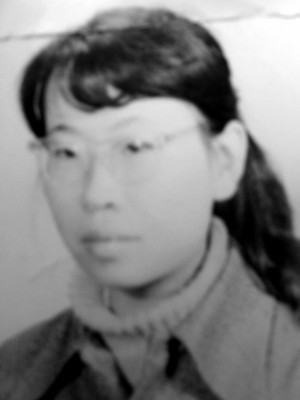Female, 29, staff member of the China National Nonferrous Metals Import & Export Corporation (CNIEC), graduate of the archive department of Renmin University of China. From: Beijing.
After dinner on June 3, 1989, Su was outside when she saw the mounting tension in the streets. As an only child, she was worried about her mother who was home by herself, having recently lost her own father as well as her husband. Su called her mother to say that she would come over to her house to keep her company. Her mother told her not to come, but Su, who loved her mother deeply, could not stop worrying and decided to bicycle there. On her way there, she was stopped at the southern side of the intersection at Nanlishi Road as martial law troops armed with submachine guns were firing into the crowds on the roadside. Su was shot in the chest. She was taken first to the Beijing Children’s Hospital, and then to the People’s Hospital, where she died.
Su’s mother, Gao Jie (高捷), is a member of the Tiananmen Mothers.

In 1987, my father, an old revolutionary, died, and in 1988, my husband died from sickness too. With one enormous blow after another, my life was in utter chaos. I was overwhelmed by sadness every day, and my daughter, my only child, was very worried when she saw the mental state I was in. She came often, to help me see my way through it and to comfort me. She always made time to be with me. It was only when I saw her that I felt there was still joy in life, still hope for the future, that I was not so alone. I never thought that this little piece of hope would also be crushed into pieces by life. . . .
The white-haired sending off the black-haired, how can anyone bear it? In these 20 years, I’ve lived in the purgatory of the loss of my daughter, spending my days in tears, having little desire to eat, and with my health deteriorating.
There is not a single moment when I don't miss her. Countless times she has appeared in my dreams in tears, saying, "Mother, I have died an unjust death. I want to live so that I can take care of you." Every year on Qing Ming festival, I go to sweep her grave. When I stand in front of her grave, I think: I can visit her now. But after I die, who will come to visit us?
What makes me even angrier is that after the sudden death of my daughter, the Party and the government that I had always trusted treated me like a dangerous element. On “sensitive” days, my house is under surveillance and my freedom of movement is restricted. Countless times I have screamed in my heart: What have we done wrong that my daughter had to die in the prime of her life, that I am to spend my dying days alone without comfort and care, that I am seen as an alien? I will fight for what is right, and I have no fear.
In these long 20 years, through countless sleepless nights, as the victim of an injustice, I have not stopped reflecting. June Fourth is the misfortune of my family, and also the misfortune of the entire people. A responsible people's government should have the courage to face facts and truth, to return innocence to the dead, and to uphold justice in history. I demand that the government publish the truth of June Fourth, compensate and apologize to the families of victims, and hold the chief perpetrators legally accountable. But time passes, year by year, and my hope is unfulfilled, year after year. The government has never provided any positive response. Now I am very sick, but I have not given up. I firmly believe that justice and conscience in humanity will not be completely wiped out. I firmly believe that I will live to see the day when justice is done.